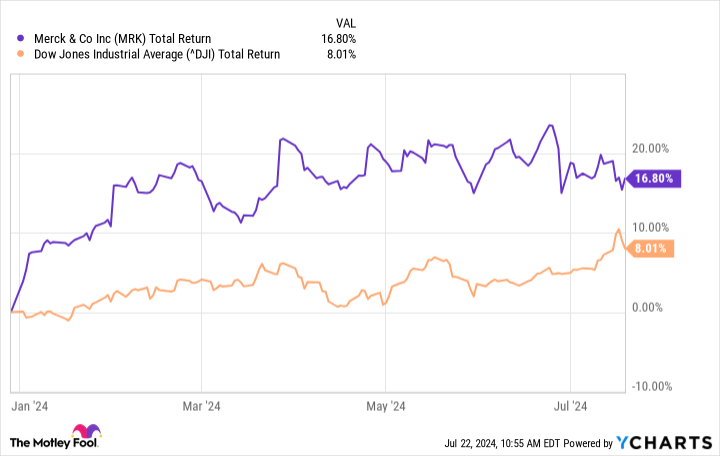The Dow Jones Industrial Average has long been a bellwether for the overall health of the U.S. stock market, tracking 30 large publicly owned companies across various sectors. While the index has seen modest gains in 2024, one of its constituents has been significantly outperforming.
Merck & Co. (NYSE: MRK), a pharmaceutical giant known for its cancer immunotherapy drug Keytruda, has seen its stock surge 16.8% year-to-date. This impressive run follows aggressive buying by a handful of institutional investors, including billionaire Kenneth Griffin’s Citadel Advisors, which purchased 1.25 million shares in the second quarter of 2024.
With Merck’s stock on a tear, should you consider following the lead of these savvy investors? Let’s dive deeper into the company’s prospects.


Keytruda: The crown jewel driving growth
Merck is a global healthcare company that delivers innovative health solutions through its prescription medicines, vaccines, biologic therapies, and animal health products. At the heart of Merck’s recent success is Keytruda, its blockbuster cancer immunotherapy drug.
Keytruda has maintained its first-mover advantage in the critical indication of first-line non-small-cell lung cancer, solidifying its position as the best-in-class option in the immuno-oncology landscape. The drug’s success has translated into outstanding financial metrics for Merck.
Analysts project a top-line growth of 14.7% for both 2024 and 2025, a robust figure for a mature blue-chip company. This growth, coupled with the high margins associated with cancer drugs, is expected to expand Merck’s overall operating margin.
However, investors should be aware that Keytruda’s U.S. patent is set to expire in 2028, which could pose a significant challenge to Merck’s revenue stream in the long term.
Attractive valuation and dividend yield
Merck’s current forward price-to-earnings ratio stands at 14.5, well below the big pharma peer group average of 17. This valuation suggests that despite the recent stock surge, Merck may still be undervalued compared with its competitors.
The company also offers a robust dividend yield of 2.45%, which looks secure given Merck’s diversified portfolio of drugs. However, it’s crucial to note that Merck’s heavy reliance on Keytruda for growth presents a double-edged sword.
While the drug’s success has driven stellar financial results over the years, it also exposes the company to potential risks. Advancements in oncology can happen rapidly, and any disruption to Keytruda’s market position could significantly affect Merck’s bottom line.
Furthermore, the company needs to bolster its late-stage pipeline outside of immuno-oncology to ensure sustainable long-term growth.
Billionaire backing and institutional support
Institutional ownership of Merck stock stands at around 78% at the time of this writing, indicating strong confidence from professional money managers. The recent purchase of 1.25 million shares by Kenneth Griffin’s Citadel Advisors in the second quarter of 2024 further underscores this bullish sentiment by top-tier investors.
Griffin, known for his savvy investment strategies, appears to be betting on Merck’s continued outperformance. However, retail investors may want to approach such moves with caution.
While following the so-called “smart money” can often be a sound strategy, it’s important to bear in mind that institutional investors may have other reasons for buying a stock other than its upside potential. Merck, for instance, could be part of a broader hedging strategy employed by Citadel, as an example.
In other words, you shouldn’t jump into any stock simply because a billionaire is loading up on it.
Key takeaways
Merck’s strong performance in 2024, backed by Keytruda’s continued growth, has caught the attention of retail and institutional investors alike. The company’s solid dividend yield and potential for further growth make it an appealing option for those looking to invest in a top Dow Jones stock.
However, potential investors should carefully weigh the risks associated with Merck’s heavy reliance on Keytruda and its looming patent expiration in 2028. While billionaire backing provides a vote of confidence, it’s crucial to weigh the drugmaker’s pros and cons before hitting the buy button.
Should you invest $1,000 in Merck right now?
Before you buy stock in Merck, consider this:
The Motley Fool Stock Advisor analyst team just identified what they believe are the 10 best stocks for investors to buy now… and Merck wasn’t one of them. The 10 stocks that made the cut could produce monster returns in the coming years.
Consider when Nvidia made this list on April 15, 2005… if you invested $1,000 at the time of our recommendation, you’d have $757,001!*
Stock Advisor provides investors with an easy-to-follow blueprint for success, including guidance on building a portfolio, regular updates from analysts, and two new stock picks each month. The Stock Advisor service has more than quadrupled the return of S&P 500 since 2002*.
*Stock Advisor returns as of July 22, 2024
George Budwell has no position in any of the stocks mentioned. The Motley Fool has positions in and recommends Merck. The Motley Fool has a disclosure policy.
Billionaires Are Loading Up on This Surging Dow Stock. Should You? was originally published by The Motley Fool
Source Agencies



